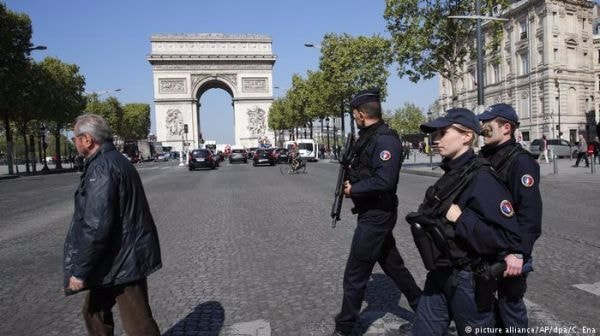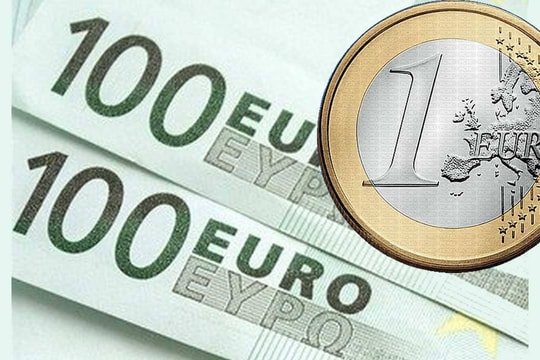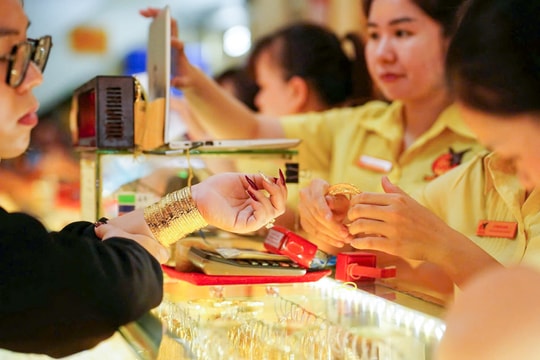'Paradise' past!
(Baonghean) - Known as the city of light, but now "covered in the shadow" of terrorism right before the election, France has clearly had to go through a difficult and unpredictable week despite careful preparation. Meanwhile, Venezuela is struggling in the context of severe inflation, economic crisis and outbreaks of violence, the title "paradise" seems to be a thing of the past...
France in trouble before G hour
When mentioning France, people immediately think of the image of the city of light, a peaceful and attractive destination for many tourists. However, it seems that these inherent concepts have been shaken quite a bit, when what everyone has always feared finally happened. In the middle of last week, another terrorist attack shook France, causing the expected presidential election to take place in a context of "change, the stars move".
France was once again the target of an attack believed to be linked to the Islamic State (IS) group on Thursday evening (April 20). On the famous Champs-Elysees avenue in Paris, the peaceful atmosphere was suddenly shattered when a man got out of a car and opened fire, killing a police officer and injuring several others.
Fear spread quickly, as the incident occurred as French security officials were scrambling to prevent similar incidents from occurring ahead of the April 23 election. Before the Champs-Elysee attack, security in France was already on high alert: more than 50,000 police officers and 7,000 soldiers from the anti-terrorism task force were expected to be deployed across the country as citizens headed to the polls.
 |
| Today (April 23), French people go to the polls amid tight security. Photo: AP |
Notably, at the time of the incident, the City of Light was still under a state of emergency. Following the series of terrorist attacks in Paris on November 13, 2015, security officials were given “special powers” such as arresting suspects at home and closing public squares without prior permission. Earlier this week, it seemed that French security forces had been tightened.
For example, police in Marseille arrested two men suspected of planning a terrorist attack. Later, authorities discovered explosives, weapons and an IS flag when searching an apartment. Current President Francois Hollande called the operation a remarkable success, and the French press was full of praise for the police’s performance.
However, according to analysis on DW, the reality shows two things: first, the police cannot prevent terrorist attacks. Second, terrorism cannot be completely prevented. Because there are thousands of potential targets in the eyes of terrorists - from schools, pubs, to airports, etc. - it is impossible to deploy security to protect all points. Moreover, security experts also point out the "dilemma" in the fight against terrorism when the police and the army are also targets of terrorism. The more police are deployed on the streets, the more targets terrorists have. This is a bitter conclusion that has been drawn from the practice of the past few years across Europe.
In France, however, the presidential candidates are trying to show their determination in the final days of the campaign. When the attack on the Champs-Elysees occurred, all 11 candidates were in the middle of their final televised debate. Upon hearing the news, the candidates first sent condolences to the police, and far-left candidate Jean-Luc Melenchon said, referring to Sunday’s first round of voting: “Let’s not be afraid. We cannot interrupt the democratic process. It is our responsibility to avoid unnecessary controversy.”
 |
| Venezuelans line up to buy bread in the capital Caracas amid shortages and rising prices. Photo: AFP |
Terrorism, of course, dominated the candidates’ agenda in the final hours before voters cast their ballots, with each trying to present himself as the best choice for the country’s leadership. Republican candidate Francois Fillon once again called for measures to deal with “identified threats” and “radical imams,” while far-right candidate Marine Le Pen of the National Front repeated her famous mantra that France must withdraw from the Schengen area, close its borders and end “uncontrolled immigration.”
It can be seen that the French will not let anything change their election plans on April 22, and the recent terrorist attack cannot scare them, because they simply do not allow terrorists to be complacent. However, the incident has affected the votes of many voters, making them consider more when performing their civic duties in the current complicated context.
Venezuela is no longer peaceful
Venezuelan authorities confirmed on April 21 that at least 12 people were killed and six others were in critical condition after violent protests in the capital Caracas. Vice President Tareck El Aissami even warned that the South American country was facing an “unusual war” led by opposition factions working in collaboration with criminal gangs. Unrest spread across Venezuela as hundreds of thousands of protesters took to the streets. Home to Caribbean beaches, the Andes Mountains and the world’s largest oil reserves, a “paradise” on earth, has suddenly become a “hell” for its people.
There are many reasons why Venezuelans are struggling with the world's highest inflation rate, not to mention bloody street protests and a general atmosphere of chaos and confusion. According to CNN's analysis, the first reason to mention is when the price of oil plummeted, causing the economy to reverse. Under Chavez, oil revenue was the main source of Venezuela's economy. When oil was $100 a barrel, billions of dollars poured in through the state oil company and were diverted to social programs and food subsidies.
But when oil prices plummeted, the massive subsidies could no longer be sustained. Another reason came from the stagnant flow of dollars. Oil prices fell, and as a result, the government did not have as much foreign currency to buy imported goods as before. A national research company in this country just said that Venezuela's import turnover has decreased by 50% compared to a year ago. Now the "paradise" of that time is suffering from a severe shortage of imported necessities, including many essential medicines.
In addition, under Chavez, prices for key commodities were adjusted down to make them more affordable. For example, a bag of corn flour costs just 639 bolívares, which is affordable for many people but lower than the cost of production, forcing domestic producers to stop producing corn flour. Furthermore, Venezuela has only $10.5 billion in foreign exchange reserves, and by the end of this year, the country will owe about $7.2 billion. The South American country's financial clock is moving closer to the alarm threshold. In such circumstances, people are forced to reluctantly "diet" and skip meals because of "huge" inflation, causing malnutrition rates to rise rapidly, and pushing current leader Nicolas Maduro into a position of criticism.
 |
| A reporter was injured while covering a protest in Caracas, Venezuela. Photo: CNN |
The grief turned to anger, which quickly erupted into violent protests in recent weeks as opposition leaders faced off with Maduro supporters. Anti-government protesters want to oust Maduro, accusing him of undermining democracy. In that situation, he was forced to send the military into the streets to maintain public order.
Having experienced life as if in paradise, the situation of food shortages, milk, flour and even toilet paper; shortages of medicine; no electricity; increasing unemployment; violence breaking out everywhere; malaria epidemics that were once pushed back now becoming a threatening "ghost"... for the Venezuelan people, today is no different from hell. The Venezuelan leadership must be urgently discussing a solution, because if the government of this country does not soon find a long-term solution, it is difficult to ensure that before "putting out" violence in one place, more violence will break out in many other places.
Thu Giang
| RELATED NEWS |
|---|

.jpeg)





